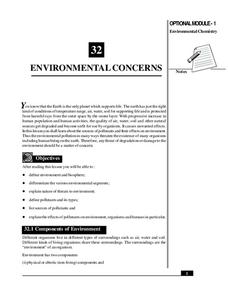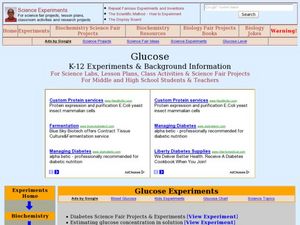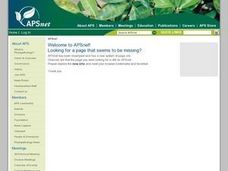National Institute of Open Schooling
Environmental Concerns
Every year, more than 14 billion pounds of garbage is dumped into the oceans of the world, most of which is plastic and toxic to ocean life. Lesson 32 in the series of 36 focuses on environmental concerns, specifically pollution. Under...
Curated OER
Glucose
High schoolers conduct various experiments on glucose. For this biology lesson, students differentiate the process of diffusion and osmosis. They test different foods for the presence of glucose and starch.
Curated OER
Composting
For this recognizing items that can be composted worksheet, students identify organic items that can be composted, write items that can be composted for each of the letters in the word compost, and make a list of vegetables and fruits....
Curated OER
Micro-Organisms
Learners investigate micro-organisms with an on line activity. In this micro-organism on line lesson plan, students identify bacteria, viruses and fungi projected onto a white board. Learners work in groups and use a computer and an on...
Curated OER
Oh, What a Tangled Web We Weave
Fifth graders investigate the food chain by viewing video clips. In this food web lesson, 5th graders investigate populations and ecosystems by viewing a video in class as well as visiting web sites. Students utilize the Internet to...
Curated OER
Freddie the Fungus:A Play about Decomposers (Elementary, Computer)
First the class learns how to write a Haiku poem. Then, they use kidpix to illustrate their poem.
Curated OER
Spud Smear
Learners study various samples of microorganisms in petri dishes. For this microorganism lesson, students place various samples of items in petri dishes and observe them after several days of incubation.
Curated OER
De"compost"ition Activity
Students investigate the decomposition process and the parameters which influence the rate at which it occurs. They design a "controlled" experiment by comparing decomposition rates between two compost piles. Analysis questions include...
Curated OER
Everything in Its Place: Science Classification
Students investigate the system of classification for living things through the sixteen lessons of this unit. The five kingdoms of monerans, protists, fungi, plants, and animals form the basis of several experiments as the similarities...
Curated OER
Micro-organisms
Students learn what a micro-organism is. In this micro-organism lesson, students understand that micro-organisms may be too small to see. Students learn microorganisms could be bacteria, fungi, something beneficial or a harmful microbe....
Alabama Learning Exchange
It's a Small, Small World
Students compare and contrast the different characteristics of animal-like, plant-like, and fungus-like protists. They list examples and describe the characteristics shared by the three protist groups. They create a brochure or slideshow...
Curated OER
Animal Relationships
Pupils study energy pyramids, food chains and food webs. For this animal relationships lesson students complete several activities and play a game.
Curated OER
COMPARE SOILS BY GROWING PLANTS
The student will identify the difference in the rate of plant growth in three soils that vary in organic matter.1. Obtain three to four flowerpots, different types of soil, a record chart, three to five beans for each pot, and water....
Biology Junction
Archaeopteryx - Ancestor to Birds
In this biology instructional activity, students label and color the different parts of an archaeopteryx. They complete a table with information about this bird.
Curated OER
Food Web
Students are able to define food web, and identify the interdependence of organisms within a system. They are able to describe how natural events and human activities can impact a food web.
Curated OER
Creepy Critters
Students develop a classification scheme based on the structural features of organisms. In this organism lesson students divide into teams and complete a fun activity.
Curated OER
Plant Classification
Students share with the class how they think plants are classified and are assessed on their prior knowledge. They use a packet to complete throughout the week at their own pace, which includes various activities to familiarize...
Curated OER
Scientific Classification
In this scientific classification worksheet, students read about classification and the questions scientists ask in order to classify, then read about features of different classifications of animals. Worksheet is informational, no...
Curated OER
Agriculture is a Cycle
What do a bicycle and the life cycle have in common? Cover this and more with the series of cross-curricular activities included in this plan. Learners do everything from making bracelets that represent the life cycle to checking out the...
Biology Junction
Bacteria Crossword Puzzle
In this biology instructional activity, students complete a crossword puzzle with 42 questions about bacteria. They identify the different characteristics of bacteria.
Curated OER
Water Molds (Oomycetes)
Students explore a group of fungus-like organisms; the Oomycetes, by baiting them from natural sources (water and soil) and observing them.
Curated OER
What's That Brown Fuzzy Stuff On My Plum?
Learners examine Koch's Postulates by actually using them. They perform each of the required four steps to show that the brown fuzzy fungus they see growing on stone fruit (plums, peaches, nectarines, cherries) is what causes them to rot.
Curated OER
What's in Our Woods?
Students observe their local forest and document the change that occurs over the school year. For this forestry lesson, students utilize a GPS to mark a certain area of the woods as their study area for the remainder of the year....
Curated OER
De-composers - Terrarium
Students explore the environment by building a mock ecosystem. In this rainforest analysis lesson, students define many environmental and rainforest related vocabulary terms and discuss the current status of our planet's rainforests....

























